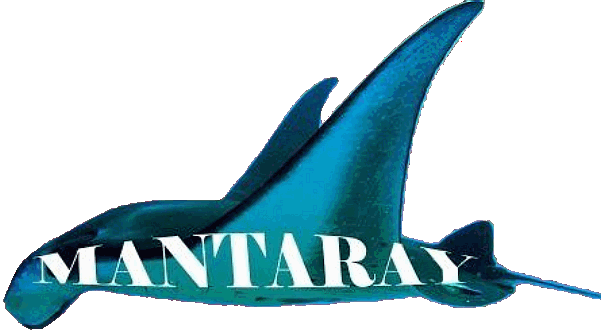|
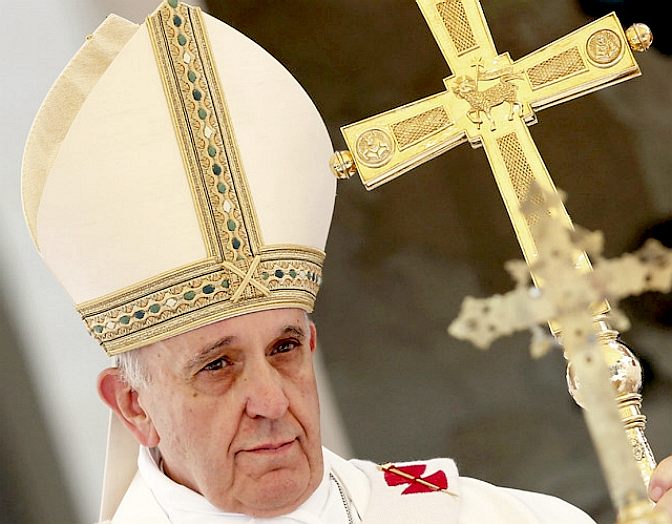
DECEMBER
2015 - The Vatican is lending itself to environmentalism with a special public art installation timed to coincide with the final stretch of climate negotiations in
Paris.
On Tuesday night, the facade of St. Peter's Basilica will be turned into a massive backdrop for a photo light show about nature organized by several humanitarian organizations.
The initiative, featuring images by National Geographic and well-known photographers including Sebastiao Salgado, is similar to ones that used the U.N. headquarters and the Empire State Building in New York as backdrops.
Pope Francis has strongly backed the environmental cause, issuing a landmark encyclical in which he blasted the fossil-fuel-based economy for impoverishing much of humanity and destroying the planet.
APRIL
30 2014 - Global Ocean Commission Co-chair Trevor Manuel met with His Holiness Pope Francis at the Vatican to discuss the future of the global ocean.
At a private audience Co-chair Trevor Manuel presented Pope Francis with the Commission’s vision for stronger high seas governance and protection, a copy can be read in Latin here, together with other Commission briefings in Spanish.
Today’s visit was the final day of a three-day delegation to the Vatican. The Commission’s visit began with a meeting with Cardinal Turkson, the Chair of the Pope’s Council on Justice and Peace, which advises the Holy Father on social and environmental affairs. The meeting was an opportunity to discuss the place of the global ocean as a focus area for the Commission and the Holy Father who is known to be developing an encyclical on the Church and the Environment.
The Commission delegation, headed by Trevor Manuel and Executive and Deputy Executive Secretaries Simon Reddy and Rémi Parmentier, also held a meeting with the Vatican’s Secretary for Relations with States, Cardinal Dominique Mamberti. This was an opportunity to discuss the role of the United Nations, governments and the Church to further advance the cause of ocean conservation and management.
Reflecting on his visit to the Vatican, Co-chair Trevor Manuel said: “All our meetings at the Vatican were a great opportunity to identify possible synergies and areas of collaboration with the Vatican and to discuss the role of faith groups in disseminating the social and environmental aspects of ocean management and conservation.”
Manuel added: “In the course of its work, the Global Ocean Commission has
recognized that the issues facing the oceans are value issues as much as policy issues, for example with regard to the equitable sharing of resources found in the high seas and their conservation for the benefit of future generations.
Furthermore, there is a moral obligation for us all to ensure adequate stewardship of our ocean environment and resources. We are hopeful that under the leadership of the Holy Father, the Church will step up its reflection and action to contribute to a wiser use of marine resources.”
The Commission aims to reach out to all global leaders and opinion-makers in the run up to the launch of its final report in New York on 24 June.
IF
WE DESTROY CREATION, CREATION WILL DESTROY US Pope Francis (Latin: Franciscus; Italian:
Francesco) was born as Jorge Mario
Bergoglio on the 17th of December
1936. He is the Catholic Church's Pope, an ancient title he holds ex officio as Bishop of Rome, in which capacity he is Sovereign ad vitam of the Vatican City State.
Born in Buenos Aires, Argentina, Bergoglio worked briefly as a chemical technician and nightclub bouncer before beginning seminary studies. He was ordained a Catholic priest in 1969 and from 1973 to 1979 was Argentina's Provincial superior of the Society of
Jesus. He became the Archbishop of Buenos Aires in 1998 and was created a cardinal in 2001 by Pope John Paul II. Following the resignation of Pope Benedict XVI on 28 February 2013, a papal conclave elected Bergoglio as his successor on 13 March. He chose Francis as his papal name in honor of Saint Francis of Assisi. Francis is the first Jesuit pope, the first from the Americas, the first from the Southern Hemisphere and the first non-European pope since the Syrian Gregory III in 741, 1,272 years earlier. He is also the third consecutive non-Italian to hold the post.
Throughout his public life, both as an individual and as a religious leader, Pope Francis has been noted for his humility, his concern for the poor and his commitment to dialogue as a way to build bridges between people of all backgrounds, beliefs and faiths. He is known for having a humble approach to the papacy, less formal than his predecessors, for instance choosing to reside in the Domus Sanctae Marthae guesthouse rather than the papal apartments of the Apostolic Palace used by his predecessors. In addition, due to both his Jesuit and Ignatian aesthetic, he is known for favoring simpler vestments void of ornamentation, including refusing the traditional papal mozzetta cape upon his election, choosing
silver instead of
gold for his piscatory ring, and keeping the same pectoral cross he had when he was cardinal. Francis has said that gay people should not be marginalized but maintained the Church's teaching against
homosexual acts; as a cardinal, he opposed same-sex
marriage in
Argentina. He maintained this view as pope. In addition, he maintains that he is a "son of the Church" regarding loyalty to Church doctrine, has spoken against abortion as "horrific", and suggested that women be valued, but not clericalized. He has stated that Catholics, namely politicians, who support abortion and euthanasia are ineligible for communion. He also said that "It is absurd to say you follow Jesus Christ but reject the Church."
Accordingly, he urged Bishop Charles J. Scicluna of Malta to speak out against adoption by same-sex couples, maintained that Catholics who remarry following
divorce may not receive the Eucharist, and excommunicated a former Catholic priest for Eucharistic sacrilege and heretical views. He emphasized the Christian obligation to assist the poor and the needy, and promoted peace negotiations and interfaith dialogue. Pope Francis has also announced a zero-tolerance policy towards
sex abuse in the Church, saying that sex abuse was "as bad as performing a satanic mass." 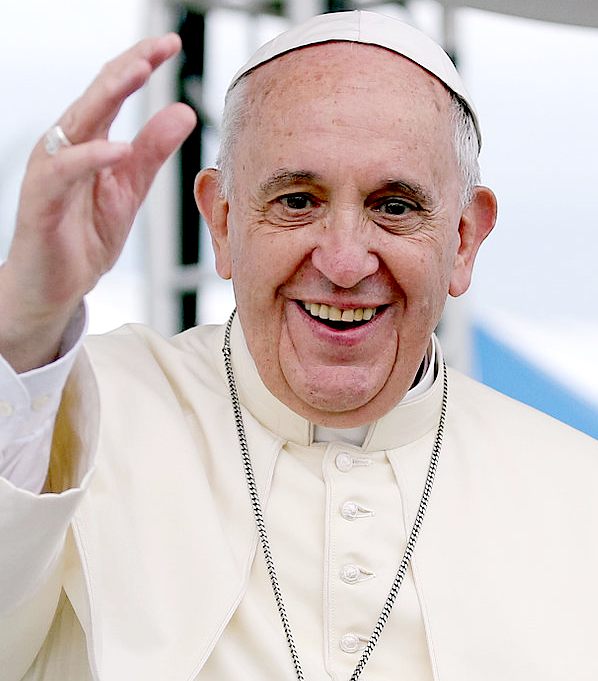
CLIMATE
CHANGE - MAY 6 2015
A declaration at the end of a meeting in Rome hosted by the Vatican made a plea to the world’s religions to engage and mobilize on the issue of
climate
change.
“Human-induced climate change is a scientific reality, and its decisive mitigation is a moral and religious imperative for humanity,” the declaration said. “In this core moral space, the world’s religions play a very vital role.”
Vatican watchers and climate experts say the meeting, “The Moral Dimensions of Climate Change and Sustainable Development,” shows that Pope Francis
is - in marked contrast to his predecessors - keen for the Catholic church to be more involved in the climate change issue, and is also urging other religions to become more actively engaged.
The meeting was organized by various religious and non-religious organizations, including the Vatican’s Pontifical Academy of Sciences and the UN-affiliated body, the Sustainable Development Solutions Network. Ban Ki-moon, the UN Secretary-General, also spoke at the one-day conference. 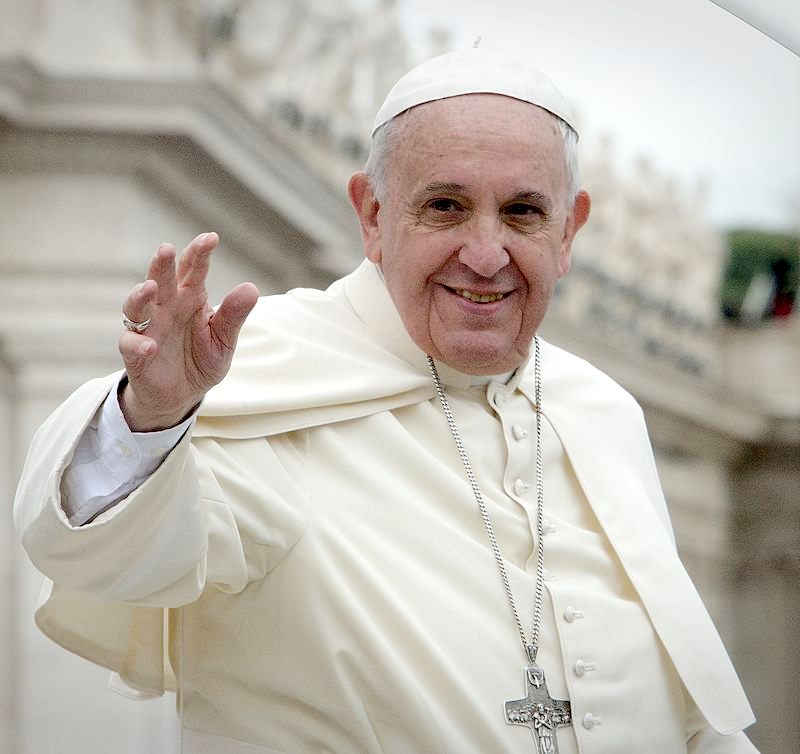
FUNDAMENTAL PRINCIPLES
In a few weeks’ time, the Pope is due to release an encyclical on climate change—within the Catholic church, a statement of fundamental principles. He has also made several impassioned speeches on the issue.
“If we destroy Creation, Creation will destroy us,” the Pope told a gathering of thousands in St Peter’s Square,
Rome, last month. “Never forget this.”
Groups that insist that climate change is not a threat, and that seek to oppose the findings of the UN’s Intergovernmental Panel on Climate Change and other scientific bodies, have been quick to criticise the Pope’s stand.
Members of the Heartland Institute, a US-based organization funded by billionaire industrialists and others who deny climate change is caused by human activity, travelled to Rome to speak against the meeting.
“The Pope has great moral authority, but he’s not an authority on climate science,” a Heartland employee told the
UK newspaper, the
Daily
Telegraph.
“The Pope would make a grave mistake if he put his moral authority behind scientists saying that climate change is a threat to the world.” 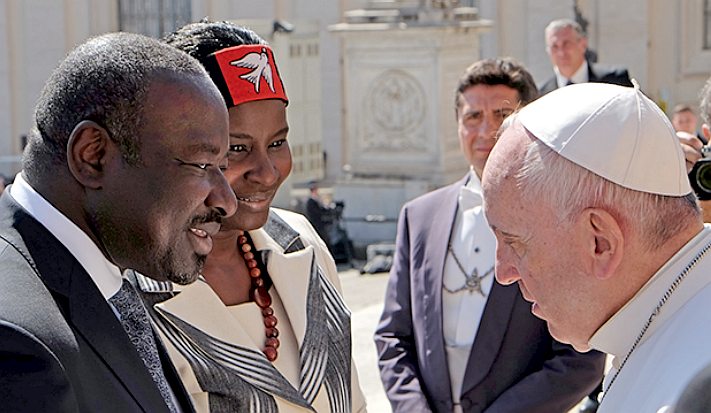
CTBTO
- The Executive Secretary of the Comprehensive Nuclear-Test-Ban Treaty Organization (CTBTO), Lassina Zerbo, met His Holiness Pope Francis on 22 April 2015 in Rome.
In their meeting, Pope Francis thanked Zerbo “for the work you are doing to ban nuclear testing and to rid the world of the abomination of nuclear weapons” and highlighted his commitment “to spreading the word that nuclear weapons are not good for the world".
"I was extremely honoured and humbled to meet His Holiness Pope Francis, who has been a tireless advocate for a world free of nuclear weapons. Pope Francis has made a powerful moral argument against the continued development and possession of nuclear weapons. The entry into force of the Comprehensive Nuclear-Test-Ban Treaty (CTBT) is a stepping stone to reach Pope Francis’ vision. Leadership is needed from the remaining eight countries to ratify the CTBT,” Zerbo said.
In his message (PDF) to the Vienna Conference on the Humanitarian Impact of Nuclear Weapons in late 2014, Pope Francis wrote that “Spending on nuclear weapons squanders the wealth of nations. To prioritize such spending is a mistake and misallocation of resources which would be far better invested in the areas of integral human development, education, health and the fight against extreme poverty.”
In a meeting with Paul R. Gallagher, Secretary for Relations with States at the Vatican, Zerbo discussed joint efforts for the universialization and entry into force of the CTBT. Gallagher expressed the Holy See's long-standing support for entry into force of the Treaty and for
nuclear disarmament, stating that right now there was "both light and darkness" in terms of progress on these issues.
SELLING INVESTMENTS
Separately, the Church of England announced that it is selling various investments in fossil fuel industries. The Church said £12
million worth of investments in companies making 10 percent or more of their revenues from the production of
coal or oil from tar sands would be sold.
The Church of England is not selling all its investments in fossil fuel operations, but says it wants to influence companies that contribute to global greenhouse gas emissions. The Church recently called on two major oil companies,
BP and Shell, to be more transparent about their policies on
climate
change.
“The Church has a moral responsibility to speak and act on both environmental stewardship and justice for the world’s poor, who are most vulnerable to climate change” says Professor Richard Burridge, of the Church’s Ethical Investment Advisory Group. 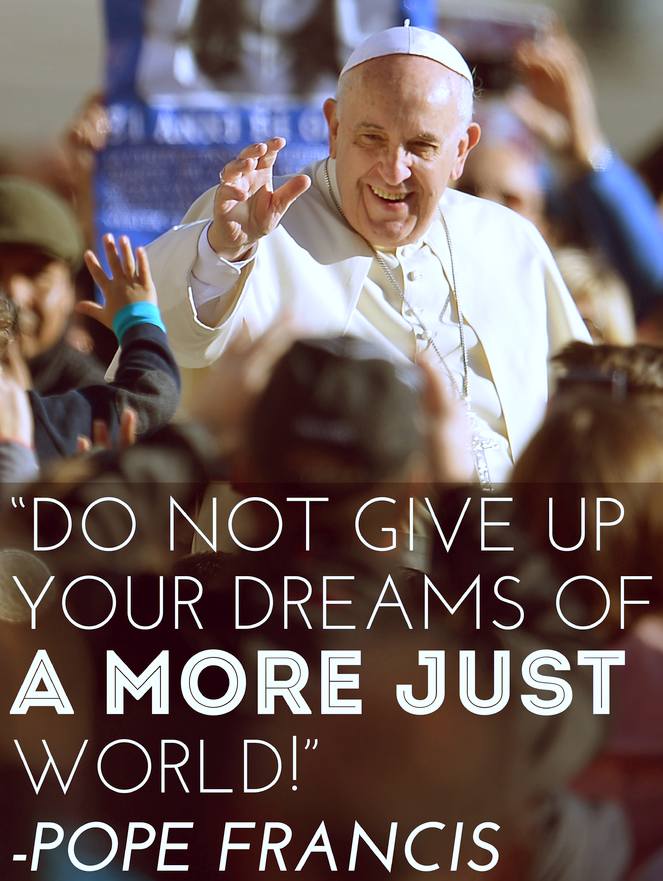
POPE FRANCIS ON THE ENVIRONMENT
After his election Francis stated, "Here too, it helps me to think of the name of Francis [of Assisi], who teaches us profound respect for the whole of creation and the protection of our environment, which all too often, instead of using for the good, we exploit greedily, to one another's detriment.". At the University of Molise he described environmental concerns as a great contemporary challenge and voiced opposition to deforestation. He believes that development should respect what Christians see as creation, and that exploiting the earth is sinful. Francis told the Second International Conference on Nutrition, held in Rome by the Food and Agriculture Organization, that a lack of protection for the ecology may generate problems. Francis plans a meeting with leaders of main religions to increase awareness of the state of the climate.
A Papal Encyclical is being prepared on global
warming, attempting to influence the 2015 United Nations Climate Change Conference. This project is opposed by Vatican conservatives, Catholic conservatives and the US evangelical movement. The encyclical is expected to be promulgated in June 2015.
As he prepares an encyclical expected this summer, Francis is sponsoring a summit meeting that will focus on the relationships connecting poverty, economic development and climate change. The meeting will include presentations and discussions by scientists, religious leaders, and economists. The United Nations secretary general, Ban Ki-moon, who is urging world leaders to approve a United Nations climate change accord in
Paris in December, will deliver the opening address. In April 2015 Francis tweeted:
“We need to care for the earth so that it may continue, as God willed, to be a source of life for the entire human family.”
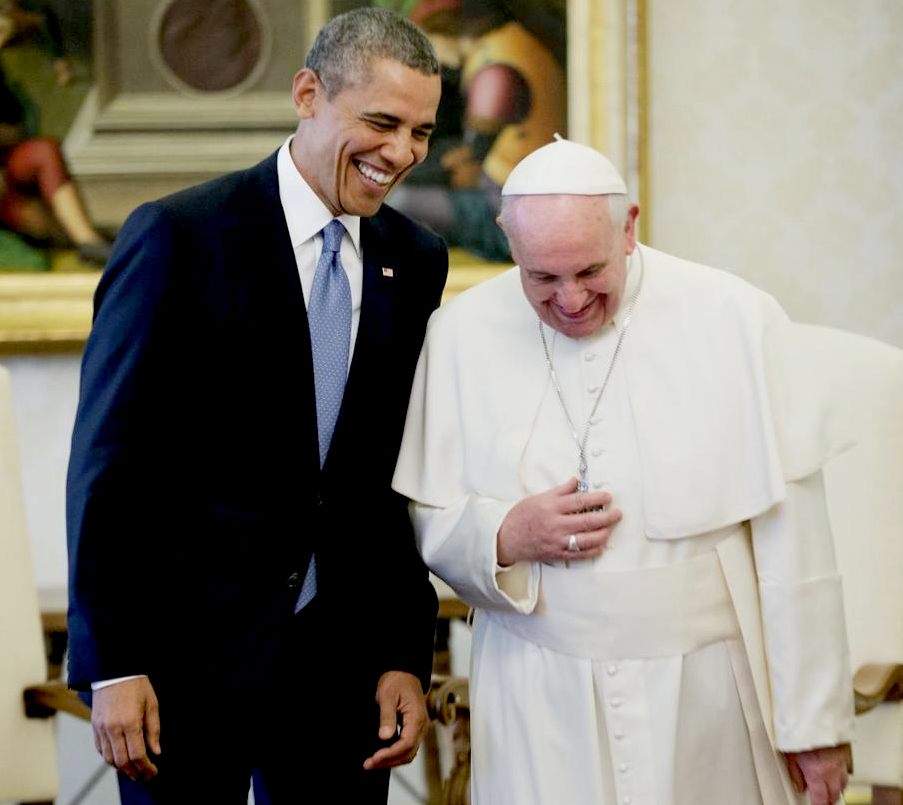
DECEMBER
2014 - Pope Francis, the first Latin American pope, has been credited with taking a key role in beginning to heal one of the Cold War’s last open wounds which is the standoff between Cuba and the United States.
Like John Paul, Francis wielded diplomacy in a part of the world he knows well and cares deeply about. And like John Paul, he may have
benefited from the tides of history, acting when the time was ripe for change.
On Thursday, Cardinal Pietro Parolin, the Vatican’s secretary of state, called Francis’ input “very significant.” Austen Ivereigh, a British writer and biographer of Francis, described a letter the pope wrote to President Obama and Cuban leader Raul Castro this summer as “the clincher.”
The letter reflected the determination to work on the issue Francis had shown when he became pope in 2013. Ivereigh further stated that Francis is a genius at breaking through and building bridges across boundaries.
President Obama thanked Francis for showing the world: “the importance of pursuing the world as it should be, rather than simply settling for the world as it is.”
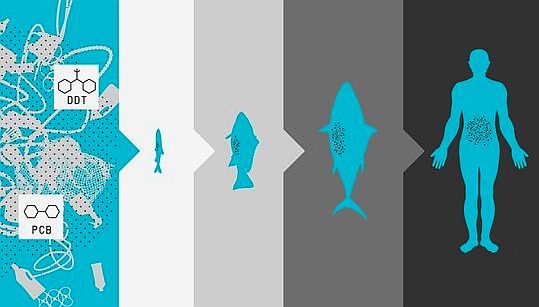
Tons of plastic floating in our oceans is a serious problem we face on this globe, considered to be one of most serious threats to our oceans. 90% of all trash floating on the ocean’s surface is in the form of plastic materials, with 46,000 pieces of plastic per square mile. Plastic does not biodegrade, it photo-degrades with sunlight, breaking down into smaller and smaller pieces. These plastic pieces are eaten by marine life and eventually works it way up the food chain
- as per the diagram below.

LINKS
& REFERENCE
CBTO
press
centre 2015 ctbto head meets Pope Francis
Huffington
Post 2015 June Rick Santorum Pope Francis on climate chance
Global
Ocean Commission mission at the vatican
Ecowatch
2015 May Pope Francis moral dimensions climate change
Wikipedia
Global_Ocean_Commission
Global
Ocean Commission
Twitter
Pontif Pope Francis
http://www.ctbto.org/press-centre/highlights/2015/ctbto-head-meets-pope-francis/
https://twitter.com/pontifex
http://www.huffingtonpost.com/2015/06/02/rick-santorum-pope-climat_n_7498768.html
http://www.globaloceancommission.org/mission-ocean-at-the-vatican/
http://ecowatch.com/2015/05/06/pope-francis-moral-dimensions-climate-change/
http://www.globaloceancommission.org/
http://en.wikipedia.org/wiki/Global_Ocean_Commission
ACID
OCEANS - ARCTIC
- ATLANTIC - BALTIC
- BERING
- CARIBBEAN - CORAL - EAST
CHINA - ENGLISH CH
GULF
MEXICO
- GOC - INDIAN
- MEDITERRANEAN -
NORTH SEA - PACIFIC
- PERSIAN GULF - SEA
JAPAN - STH
CHINA
PLANKTON
- PLASTIC
- PLASTIC
OCEANS - UNCLOS
- WOC
- WWF
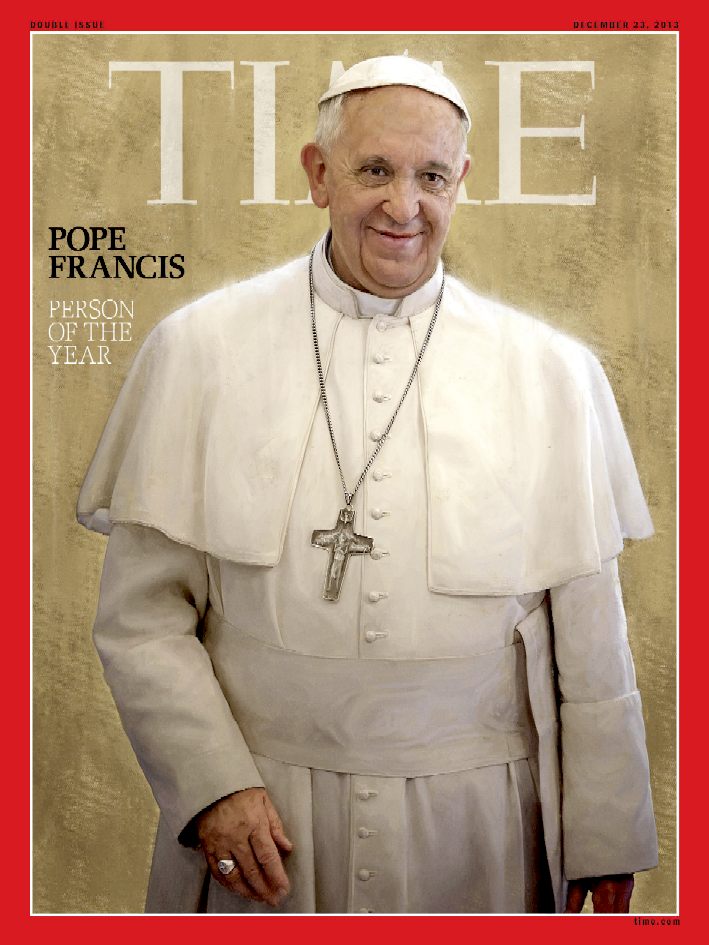
|









